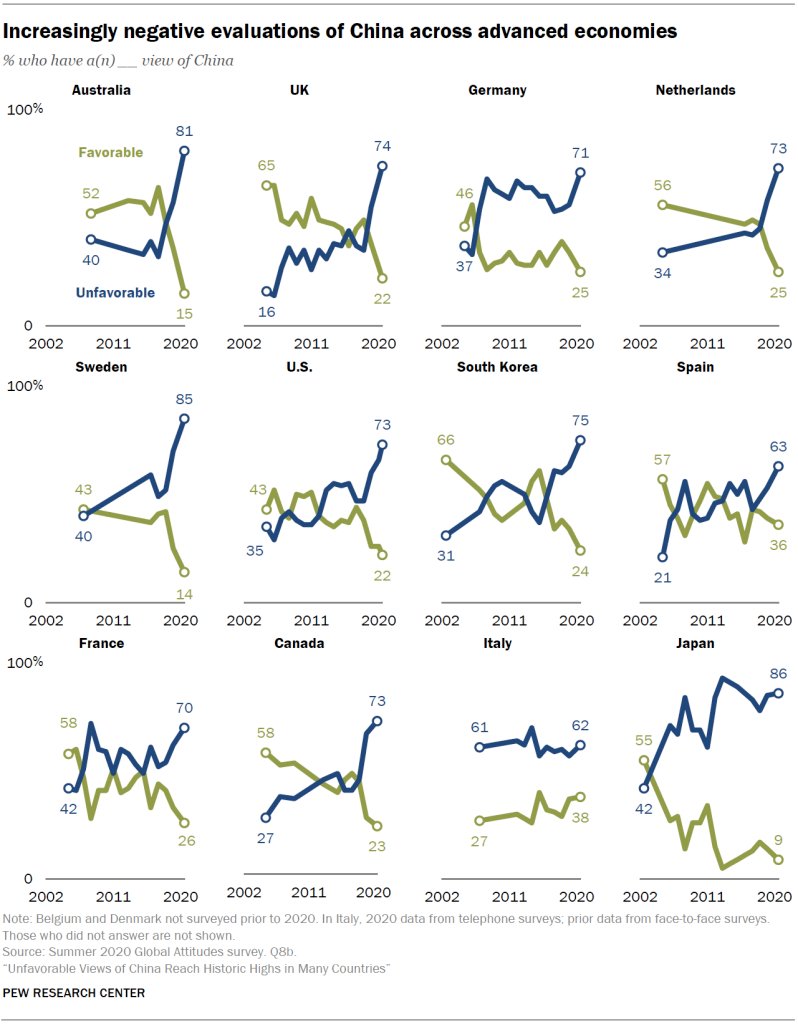
1/This raises an interesting point. Does antipathy toward the government of a country imply antipathy toward its people?
Hopefully not. But maybe! It's complicated.
Hopefully not. But maybe! It's complicated.
https://twitter.com/CarlZha/status/1313128031876046848
2/If you're not a bigot, then you'll recognize the basic truth that most people, in most countries, are good people (most of the time).
But organizations, made up of people, sometimes do very bad things. Concentration camps, invasions, ecological destruction, etc. etc.
But organizations, made up of people, sometimes do very bad things. Concentration camps, invasions, ecological destruction, etc. etc.
3/Therefore there's a natural tendency to mentally separate the people of a country from its leadership.
To view Americans positively while hating Trump, for example.
Or to say "I don't hate China, I hate the CCP." Which many people say.
To view Americans positively while hating Trump, for example.
Or to say "I don't hate China, I hate the CCP." Which many people say.
4/In the extreme, this leads us to imagine a world of "lions led by donkeys" (an old WW1 saying).
Which leads us to the notion that we could get rid of the problem if we could only change a country's leadership.
But this is a very dangerous idea in practice...
Which leads us to the notion that we could get rid of the problem if we could only change a country's leadership.
But this is a very dangerous idea in practice...
5/Bush, for example, thought he could separate our actions toward the Iraqi people from our actions toward Saddam Hussein.
I remember U.S. soldiers chanting "Iraqis! Iraqis!" as they helped topple a statue of Saddam in 2003.
en.wikipedia.org/wiki/Firdos_Sq…
I remember U.S. soldiers chanting "Iraqis! Iraqis!" as they helped topple a statue of Saddam in 2003.
en.wikipedia.org/wiki/Firdos_Sq…
6/Hurting the leadership of a foreign country, whether through war, sanctions, or other sorts of pressure, generally involves hurting the people of that country too.
7/In America, we also have a tendency to convince ourselves that autocratic or repressive governments must be unpopular with their people.
But China's government, despite concentration camps and tons of repressive laws, is wildly popular in China.
news.harvard.edu/gazette/story/…
But China's government, despite concentration camps and tons of repressive laws, is wildly popular in China.
news.harvard.edu/gazette/story/…
8/When we see the popularity of governments that do bad things, one reaction is to view the people of that country as generally bad. To think that Trump voters are evil because they voted for Trump, Chinese people are evil because they support the CCP, etc. etc.
9/And this line of reasoning leads some back toward the idea of whole-nation conflict. They discard the seemingly self-evident notion that "people are good, governments are evil", and say that well, OK, maybe sometimes whole populations of people ARE evil.
That's very dangerous.
That's very dangerous.
10/So what do we do?
Do we try to separate populations from governments in our mind, even though it's often impossible in practice?
Or do we embrace the seductive idea that sometimes whole nations or populations are bad?
Do we try to separate populations from governments in our mind, even though it's often impossible in practice?
Or do we embrace the seductive idea that sometimes whole nations or populations are bad?
11/My ideal answer is: Neither.
What we SHOULD do is to focus not on moral judgments, but on goals.
Peace between nations, universal human rights, etc.
And we should do what we need to do to achieve those goals.
What we SHOULD do is to focus not on moral judgments, but on goals.
Peace between nations, universal human rights, etc.
And we should do what we need to do to achieve those goals.
12/We should discard the idea of a world of heroes and villains, where our job is to be the heroes and figure out who the villains are and punish the villains.
Geopolitics is not a Marvel movie.
Geopolitics is not a Marvel movie.
13/But this is what I think we SHOULD do.
What will we actually do?
If history is any guide, it will be some combination of racism, bellicosity, willful ignorance and catastrophic foolishness.
What will we actually do?
If history is any guide, it will be some combination of racism, bellicosity, willful ignorance and catastrophic foolishness.
14/Let's hope that technological advances, social evolution, and centuries of history are enough to make us a better, saner, more considerate, more peaceful species than we used to be.
In other words, let's hope @sapinker is right.
amazon.com/Better-Angels-…
In other words, let's hope @sapinker is right.
amazon.com/Better-Angels-…
15/Unfortunately this is a pretty weak answer to questions like what we should do about human rights abuses in other countries, how we should respond to territorial aggression, etc. Those remain unsolved problems.
(end)
(end)
• • •
Missing some Tweet in this thread? You can try to
force a refresh










